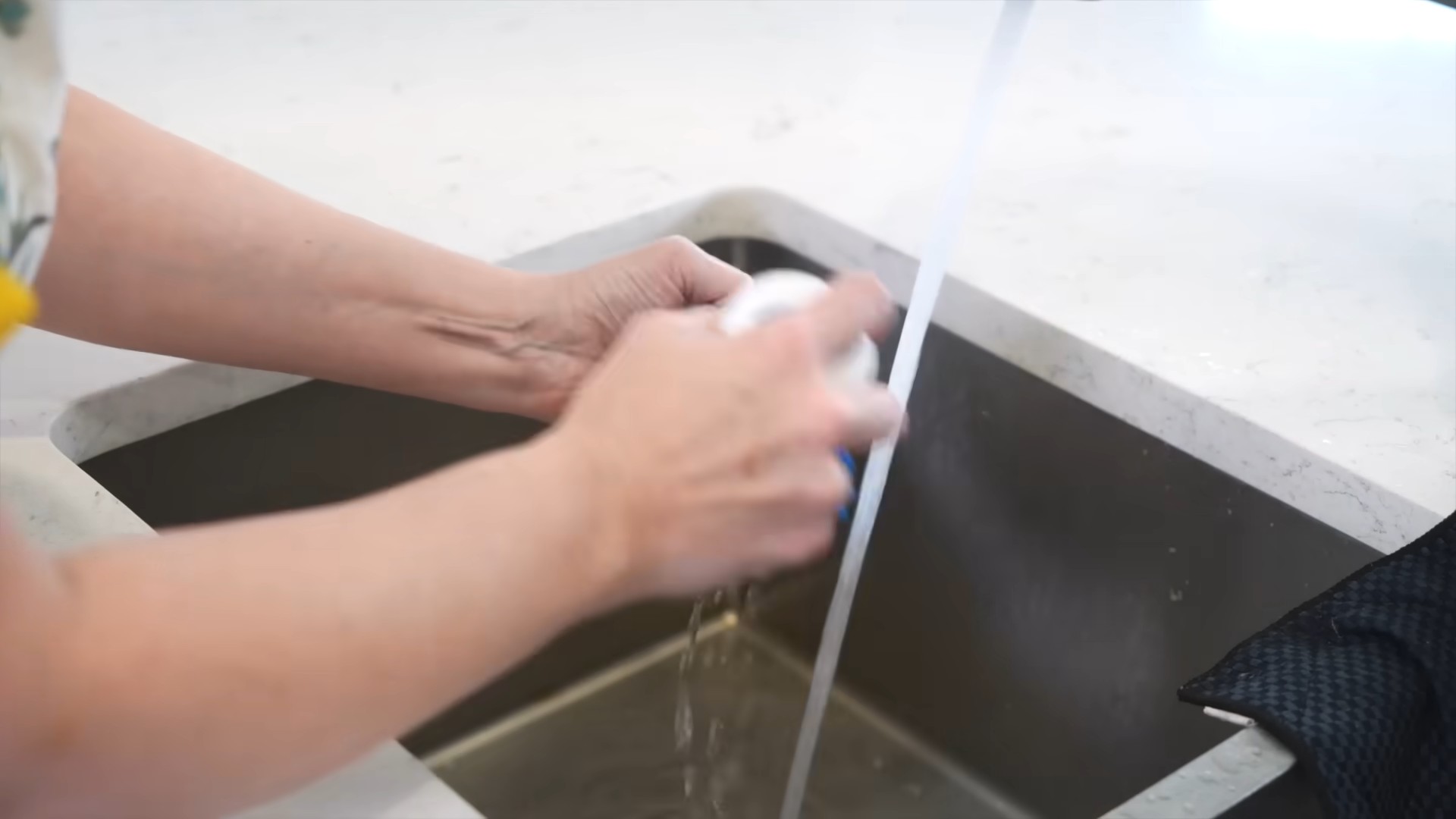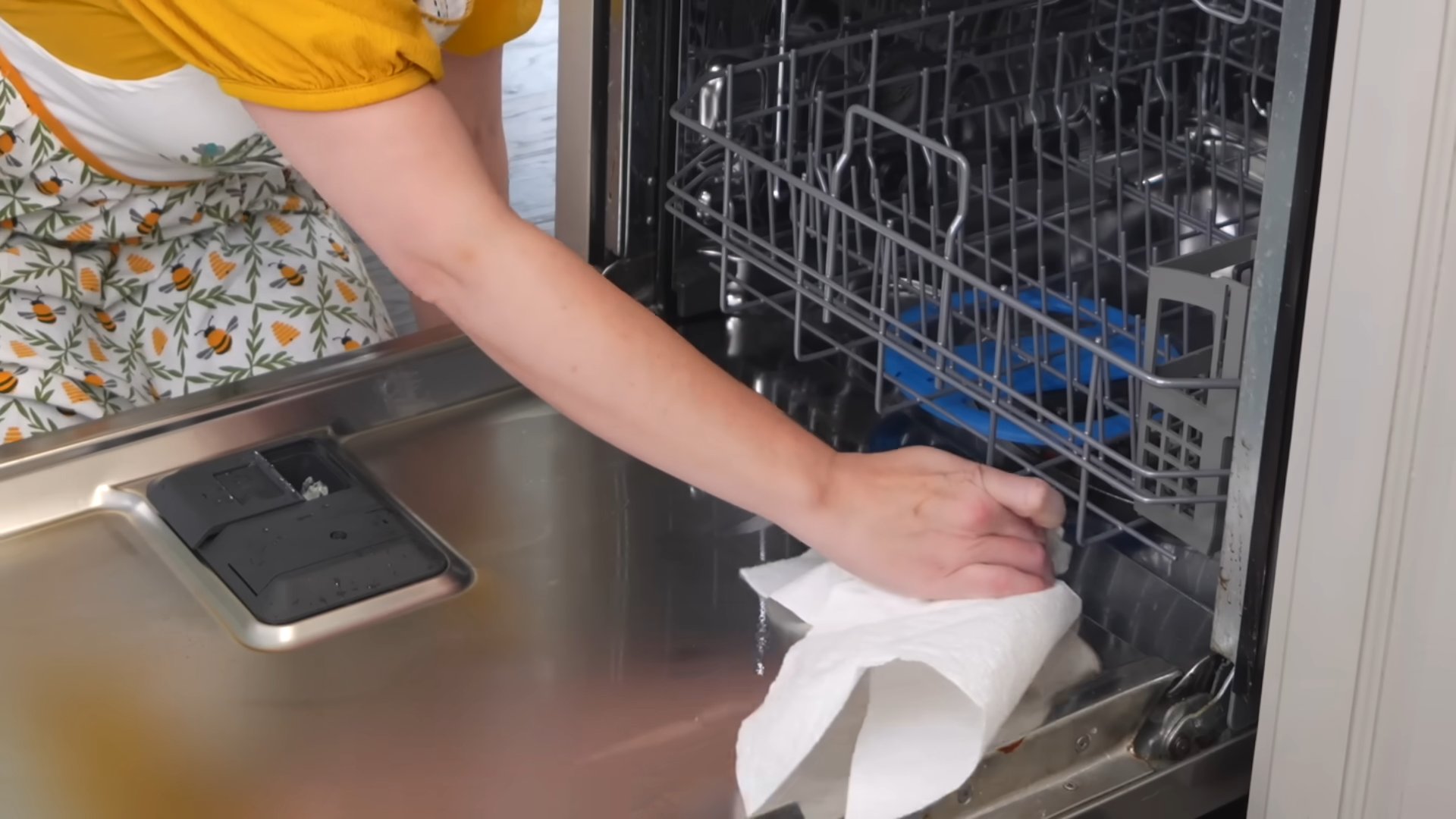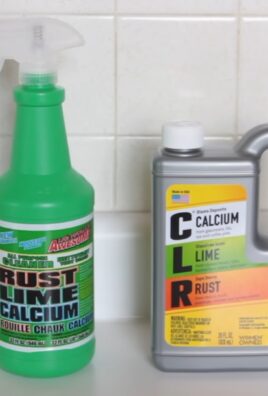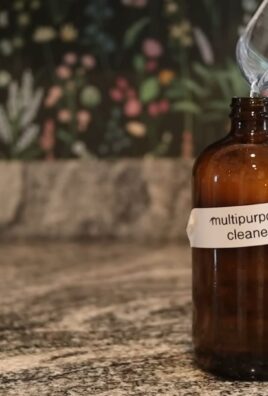Speedy dishwasher cleaning hacks are a game-changer, trust me! Are you tired of opening your dishwasher to find lingering odors, cloudy glasses, or even worse – food particles stubbornly clinging to your dishes? I know I was! It felt like a never-ending battle, and honestly, who has time for that?
Dishwashers, while a relatively modern convenience, have roots in the late 19th century. Josephine Cochrane, frustrated with her servants chipping her fine china, invented the first commercially successful dishwasher. While her motivation was preserving precious heirlooms, today, we rely on dishwashers to save time and effort. But even these amazing machines need a little TLC to function at their best.
That’s where these speedy dishwasher cleaning hacks come in. Let’s face it, a dirty dishwasher can’t properly clean your dishes. It’s like trying to wash your car with a dirty sponge! These simple, DIY tricks will not only keep your dishwasher sparkling and fresh but also improve its performance and extend its lifespan. Plus, you’ll save money on expensive cleaning products. So, ditch the frustration and get ready to discover some easy and effective ways to keep your dishwasher running smoothly!

Speedy Dishwasher Cleaning Hacks: Sparkling Clean in No Time!
Okay, let’s be honest, cleaning the dishwasher is probably nobody’s favorite chore. But a clean dishwasher means cleaner dishes, and that’s something we can all get behind! I’m going to share my favorite speedy dishwasher cleaning hacks that will have your machine sparkling in no time. We’re talking about simple, effective methods using things you probably already have in your pantry. Get ready to say goodbye to grime and hello to gleaming dishes!
What You’ll Need
Before we dive in, let’s gather our supplies. The beauty of these hacks is that they’re super budget-friendly!
* White Vinegar: This is our star player! Vinegar is a natural disinfectant and degreaser.
* Baking Soda: Another powerhouse cleaner, baking soda helps deodorize and scrub away stubborn stains.
* Dish Soap: Just a little bit of your regular dish soap will do.
* Toothbrush (Old): Perfect for getting into those hard-to-reach nooks and crannies.
* Sponge or Cloth: For wiping down surfaces.
* Rubber Gloves (Optional): If you prefer to protect your hands.
* Screwdriver (Possibly): Depending on your dishwasher model, you might need this to remove the spray arms.
* Paper Towels: For drying.
Hack 1: The Vinegar Rinse – A Quick Refresh
This is my go-to for a quick refresh. It’s so easy and makes a noticeable difference.
1. Empty the Dishwasher: Make sure your dishwasher is completely empty. No stray forks allowed!
2. Vinegar Power: Fill a dishwasher-safe cup or bowl with one cup of white vinegar.
3. Placement is Key: Place the cup or bowl on the top rack of your dishwasher.
4. Run a Hot Cycle: Close the dishwasher and run a normal hot water cycle. Don’t add any detergent! The vinegar will work its magic, dissolving grease and grime.
5. Let it Air Dry: Once the cycle is complete, open the dishwasher and let it air dry. You’ll notice a fresher scent and a cleaner interior.
Hack 2: Baking Soda Boost – Tackling Stubborn Odors
If your dishwasher has a lingering odor, baking soda is your best friend.
1. Empty the Dishwasher (Again!): Just like before, make sure your dishwasher is empty.
2. Baking Soda Sprinkle: Sprinkle one cup of baking soda evenly across the bottom of the dishwasher.
3. Overnight Magic: Let the baking soda sit overnight. This allows it to absorb any lingering odors.
4. Short Hot Cycle: The next morning, run a short, hot water cycle. Again, no detergent needed!
5. Fresh and Clean: Your dishwasher should now smell much fresher.
Hack 3: Deep Clean – Getting into the Nitty-Gritty
This is where we get serious about cleaning. This method involves a bit more elbow grease, but it’s worth it for a truly sparkling dishwasher.
Phase 1: Cleaning the Filter
The filter is where all the food particles end up, so it’s crucial to keep it clean.
1. Locate the Filter: Your dishwasher filter is usually located at the bottom of the dishwasher, near the spray arm. Consult your dishwasher’s manual if you’re unsure where to find it.
2. Remove the Filter: Most filters can be easily removed by twisting or lifting them out.
3. Rinse Thoroughly: Rinse the filter under hot running water. Use a toothbrush to scrub away any stubborn food particles.
4. Reinstall the Filter: Once the filter is clean, reinstall it securely in its place.
Phase 2: Cleaning the Spray Arms
Clogged spray arms can significantly reduce your dishwasher’s cleaning power.
1. Remove the Spray Arms: Depending on your dishwasher model, you may be able to simply pull the spray arms off. Others may require you to unscrew them with a screwdriver.
2. Inspect the Nozzles: Examine the spray arm nozzles for any clogs.
3. Clear the Clogs: Use a toothpick, wire hanger, or small brush to clear any clogs in the nozzles. You can also soak the spray arms in a solution of hot water and vinegar for about 30 minutes to loosen stubborn debris.
4. Rinse and Reinstall: Rinse the spray arms thoroughly and reinstall them securely.
Phase 3: Cleaning the Door and Seals
Don’t forget about the door and seals! These areas can accumulate grime and mildew.
1. Prepare a Cleaning Solution: Mix a solution of warm water and dish soap.
2. Wipe Down the Door: Use a sponge or cloth to wipe down the inside and outside of the dishwasher door.
3. Clean the Seals: Pay special attention to the rubber seals around the door. Use a toothbrush to scrub away any mildew or grime.
4. Rinse and Dry: Rinse the door and seals with clean water and dry them with a paper towel.
Phase 4: The Final Vinegar and Baking Soda Combo
This final step combines the power of vinegar and baking soda for a truly deep clean.
1. Vinegar Wash: Place a dishwasher-safe cup or bowl filled with one cup of white vinegar on the top rack of the dishwasher.
2. Baking Soda Sprinkle: Sprinkle one cup of baking soda across the bottom of the dishwasher.
3. Run a Hot Cycle: Run a normal hot water cycle.
4. Air Dry: Let the dishwasher air dry completely.
Hack 4: Lemon Freshness – A Natural Deodorizer
This hack is all about adding a fresh, citrusy scent to your dishwasher.
1. Save Your Lemon Rinds: After using lemons for cooking or drinks, save the rinds.
2. Placement is Key: Place the lemon rinds in the silverware basket or on the top rack of the dishwasher.
3. Run a Normal Cycle: Run a normal dishwasher cycle with your regular detergent.
4. Fresh Scent: The lemon rinds will release their natural oils, leaving your dishwasher smelling fresh and clean.
Hack 5: Preventative Measures – Keeping Your Dishwasher Clean Longer
The best way to keep your dishwasher clean is to prevent it from getting too dirty in the first place. Here are a few preventative measures I swear by:
* Scrape Your Dishes: Always scrape off excess food from your dishes before loading them into the dishwasher. This will prevent food particles from clogging the filter and spray arms.
* Rinse When Necessary: For heavily soiled dishes, give them a quick rinse before loading them into the dishwasher.
* Regular Filter Cleaning: Clean your dishwasher filter at least once a month, or more often if you notice a buildup of food particles.
* Run a Vinegar Rinse Regularly: Run a vinegar rinse every month or two to keep your dishwasher fresh and clean.
* Don’t Overload: Overloading the dishwasher can prevent dishes from getting properly cleaned and can also contribute to food buildup.
* Use the Right Detergent: Make sure you’re using a high-quality dishwasher detergent that is designed for your dishwasher model.
* Check the Spray Arms: Periodically check the spray arms for clogs and clear them as needed.
Troubleshooting Common Dishwasher Problems
Sometimes, even with regular cleaning, you might encounter some common dishwasher problems. Here’s how to troubleshoot them:
* Cloudy Glasses: Cloudy glasses can be caused by hard water or mineral buildup. Try adding a rinse aid to your dishwasher or running a vinegar rinse more frequently.
* Spotty Dishes: Spotty dishes can be caused by hard water, low detergent levels, or clogged spray arms. Make sure you’re using enough detergent and that your spray arms are clean.
* Lingering Odors: Lingering odors can be caused by food buildup or mildew. Try running a baking soda cycle or cleaning the door seals with a toothbrush.
* Dishwasher Not Draining: If your dishwasher isn’t draining properly, check the drain hose for clogs. You may also need to clean the drain pump filter.
* Dishes Not Getting Clean: If your dishes aren’t getting clean, check the spray arms for clogs, make sure you’re using enough detergent, and avoid overloading the dishwasher.
Safety First!
Before you start cleaning your dishwasher, here are a few safety tips to keep in mind:
* Unplug the Dishwasher: For any major cleaning or repairs, unplug the dishwasher from the power outlet to prevent electric shock.
* Wear Gloves: If you have sensitive skin, wear rubber gloves to protect your hands from harsh cleaning chemicals.
* Avoid Mixing Chemicals: Never mix different cleaning chemicals together, as this can create dangerous fumes.

Conclusion
So, there you have it! Mastering these speedy dishwasher cleaning hacks isn’t just about having a sparkling clean appliance; it’s about extending its lifespan, improving its performance, and ultimately saving you time and money. Think of it as preventative maintenance that pays dividends in the long run. A clean dishwasher means cleaner dishes, less re-washing, and a more hygienic kitchen overall.
But why is this a must-try? Because unlike expensive commercial cleaners that often contain harsh chemicals, these DIY methods are gentle, effective, and utilize ingredients you likely already have in your pantry. We’re talking about harnessing the power of vinegar, baking soda, and lemon – natural powerhouses that cut through grease, eliminate odors, and leave your dishwasher looking and smelling fresh.
Imagine opening your dishwasher to find gleaming racks, sparkling spray arms, and a fresh, clean scent instead of lingering food odors. That’s the reality these hacks can deliver. And the best part? They’re incredibly easy to implement, requiring minimal effort and time.
Beyond the Basics: Variations and Enhancements
While the core methods we’ve discussed are highly effective, feel free to experiment and personalize them to suit your specific needs and preferences.
* Essential Oil Boost: Add a few drops of your favorite essential oil (lemon, tea tree, or lavender are excellent choices) to the baking soda paste or vinegar rinse for an extra burst of freshness and antimicrobial benefits.
* Citrus Power: If you don’t have lemons on hand, orange or grapefruit peels can also be used in the vinegar rinse. They contain similar citric acid properties and impart a pleasant citrusy aroma.
* Borax for Stubborn Stains: For particularly stubborn stains or mineral buildup, consider adding a tablespoon of borax to the dishwasher detergent compartment during a cleaning cycle. However, use borax sparingly and ensure it’s thoroughly rinsed away.
* Deep Clean the Filter: Don’t forget the dishwasher filter! Regularly remove and clean it under running water to remove trapped food particles. A clogged filter can significantly reduce your dishwasher’s cleaning efficiency.
* Targeted Cleaning: Use an old toothbrush dipped in baking soda paste to scrub hard-to-reach areas, such as the door seals and around the detergent dispenser.
We believe that incorporating these speedy dishwasher cleaning hacks into your regular cleaning routine will make a noticeable difference in the performance and longevity of your appliance. It’s a small investment of time that yields significant returns in terms of cleanliness, efficiency, and cost savings.
So, what are you waiting for? Give these DIY tricks a try and experience the satisfaction of a sparkling clean dishwasher. We’re confident you’ll be amazed by the results.
Share Your Success!
We’d love to hear about your experience with these speedy dishwasher cleaning hacks. Did you find them helpful? Did you try any variations? Share your tips, tricks, and before-and-after photos in the comments below. Your feedback will not only help us improve this guide but also inspire others to embrace the power of DIY cleaning. Let’s create a community of sparkling clean dishwashers!
FAQ
Q: How often should I clean my dishwasher using these hacks?
A: The frequency of cleaning depends on how often you use your dishwasher. As a general guideline, aim to deep clean your dishwasher using the vinegar and baking soda method at least once a month. If you use your dishwasher very frequently (daily or multiple times a day), you might consider cleaning it every two weeks. For lighter use, cleaning every other month may suffice. Regularly cleaning the filter (at least once a week) is also crucial, regardless of how often you run the dishwasher.
Q: Is it safe to use vinegar in my dishwasher? I’ve heard it can damage the seals.
A: While it’s true that prolonged exposure to highly concentrated vinegar *could* potentially degrade rubber seals over a very long period, the diluted vinegar used in these cleaning hacks is generally considered safe for most dishwashers. The key is to use white distilled vinegar and to avoid using it in every single wash cycle. The short, controlled cleaning cycles are unlikely to cause any significant damage. If you’re concerned, check your dishwasher’s manual for specific recommendations or warnings regarding vinegar use. You can also test a small, inconspicuous area of the seal with diluted vinegar before performing a full cleaning cycle.
Q: Can I use apple cider vinegar instead of white distilled vinegar?
A: While apple cider vinegar has some cleaning properties, white distilled vinegar is generally preferred for dishwasher cleaning due to its higher acidity and lack of coloring. Apple cider vinegar may leave a slight residue or stain, especially on lighter-colored dishwasher interiors. White distilled vinegar is more effective at dissolving mineral deposits and removing odors.
Q: My dishwasher has a stainless steel interior. Are these cleaning hacks safe for it?
A: Yes, these cleaning hacks are generally safe for dishwashers with stainless steel interiors. Vinegar and baking soda are non-abrasive and won’t scratch or damage the stainless steel. However, it’s always a good idea to test a small, inconspicuous area first to ensure there are no adverse reactions. Avoid using abrasive cleaners or scouring pads, as these can scratch the stainless steel surface.
Q: My dishwasher smells terrible, even after cleaning it. What could be the problem?
A: Lingering odors in your dishwasher can be caused by several factors:
* Food particles: Ensure you’re scraping food off dishes before loading them into the dishwasher.
* Clogged filter: A clogged filter is a common culprit for bad smells. Clean it regularly.
* Drainage issues: Check the drain hose for any kinks or blockages that might be preventing proper drainage.
* Mold or mildew: If the odor is musty, mold or mildew may be growing in the dishwasher. Try running a cycle with bleach (if your dishwasher manufacturer approves) or a commercial dishwasher cleaner specifically designed to kill mold and mildew.
* Hard water: Hard water can leave mineral deposits that trap odors. Consider using a dishwasher detergent with a water softener or adding a dishwasher salt to your machine.
Q: Can I use these hacks to clean my dishwasher’s exterior?
A: Yes, you can use a diluted vinegar solution to clean the exterior of your dishwasher. Simply mix equal parts white distilled vinegar and water in a spray bottle, spray the exterior surface, and wipe it down with a clean cloth. For stainless steel exteriors, follow the grain of the steel to avoid streaks.
Q: My dishwasher has a self-cleaning cycle. Do I still need to use these hacks?
A: While a self-cleaning cycle can help remove some buildup and debris, it’s not a substitute for regular deep cleaning using these hacks. Self-cleaning cycles often use high temperatures and may not effectively remove all food particles, mineral deposits, or odors. Using these DIY methods in conjunction with the self-cleaning cycle will ensure your dishwasher stays clean and performs optimally.
Q: I don’t have baking soda. Can I use something else?
A: Baking soda is a key ingredient in these cleaning hacks due to its mild abrasive and deodorizing properties. While there isn’t a perfect substitute, you could try using washing soda (sodium carbonate) instead. Washing soda is more alkaline than baking soda and can be more effective at removing grease and grime. However, it’s also more caustic, so use it with caution and wear gloves. Avoid using baking powder, as it contains other ingredients that may not be suitable for dishwasher cleaning.
Q: How do I prevent my dishwasher from getting dirty in the first place?
A: Prevention is key to keeping your dishwasher clean and functioning properly. Here are some tips:
* Scrape dishes thoroughly: Remove as much food as possible before loading dishes into the dishwasher.
* Load dishes properly: Avoid overcrowding the dishwasher, as this can prevent proper water circulation and cleaning.
* Use the correct amount of detergent: Using too much detergent can leave a residue, while using too little may not clean dishes effectively.
* Run the hot water tap before starting the dishwasher: This ensures that the dishwasher starts with hot water, which is more effective at cleaning.
* Clean the filter regularly: As mentioned earlier, cleaning the filter is crucial for preventing clogs and odors.
* Leave the dishwasher door slightly ajar after each cycle: This allows air to circulate and helps prevent mold and mildew growth.
By following these tips and incorporating these speedy dishwasher cleaning hacks into your routine, you can keep your dishwasher sparkling clean and extend its lifespan for years to come.





Leave a Comment